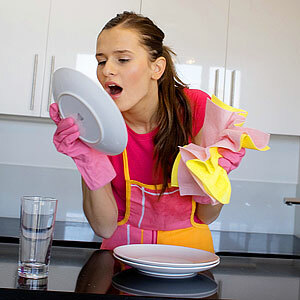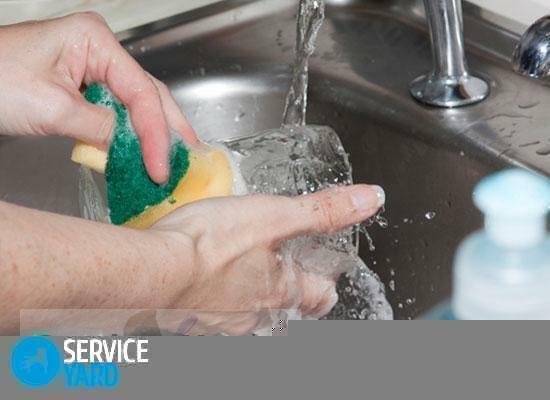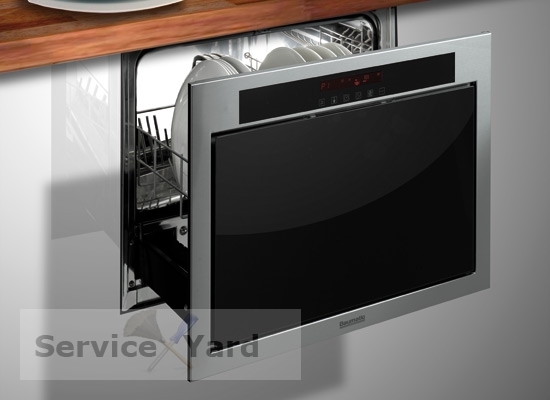
- How to choose a harmless dishwashing detergent?
- How to properly wash dishes?
- How to get rid of plaque and fat on frequently used dishes?
- How to properly wash delicate dishes - glass, porcelain, faience?
- What else can I wash the dishes?
- Additional recommendations
- How to clean dishes in the dishwasher?
The work that is always present in the house is washing dishes. Therefore, the question of how best to wash dishes is always relevant. It seems that a minute ago everything was washed, as in the sink there is a new pot of utensils. Of course, it's nice to have a dishwasher, but if someone does not have the opportunity to purchase it? How can you quickly cope with the newly emerging work quickly, efficiently, and using the minimum of forces? Our advice will help you.
to the contents ↑How to choose a harmless dishwashing detergent?
Washing dishes should not harm the human body. The content of phosphates and other harmful substances in the detergent is unacceptable. It should foam well and remove fat. Therefore, before you wash the dishes, be sure to check the quality of the selected product.
 The composition of harmless solutions, gels, kitchen soap should include:
The composition of harmless solutions, gels, kitchen soap should include:
- citric acid, organic - it dissolves without residue and is able to remove persistent impurities;
- alcohol - used for viscosity control;
- SAV sugar - takes care of the skin, dissolves, without harming the environment;
- fatty alcohol sulphate, whose cleansing force lasts longer than usual oil;
- Aloe vera - takes care of your hands. Does not include phosphates and is soluble by microorganisms.
How to wash dishes?
This process is not complicated. The main requirements are as follows:
- Use only hot water. In cold - detergents are not so effective.
- After washing with a detergent, rinse thoroughly with clean running water.
- It is recommended to use abrasive tools for cleaning heavily dirty dishes.
- Dry appliances, pots, cups on a special stand, placing the utensil with the rib so as to get rid of excess liquid.
How to get rid of plaque and fat on frequently used dishes?
There are several common ways to quickly and effectively cope with washing dishes, even if it is heavily soiled. If you can not solve the problem and are wondering how to wash off fatty metal utensils, teapot, cups or cutlery from the plaque, be sure to check out the tips below:
- to get rid of coffee and tea raids inside the cups, wipe the soiled areas with a cotton-wool soaked in vinegar;
- dishes with a narrow neck can be easily cleaned by adding egg-shell detergent into it - vigorous shaking will quickly remove all dirt;
- sheets from the oven, clean food baking soda, then rinse and put in a warm oven to evaporate the water;
- to clean the flower vases from the greenish plaque, use vinegar with salt, diluted in water;
- from fat, it is good to wash nickel-coated dishes with a solution of a spoonful of vinegar and a spoonful of salt or hot water with ammonia;
- bottles and cups after milk first treat in cold water, and after already in the hot;
- to remove the knife from the smell of onions can be with the help of raw carrots or potatoes - rub the blade with a peeled vegetable;
- clean forks and spoons will help baking soda or sand;
- , before cooking in a pressure cooker, boil a small amount of milk in it - this will help the metal from which it is made to not fade;
- perfectly copes with oil surfaces coffee grounds - pour the mass and rub with a sponge, then rinse the object well;
- to clean the kettle from scale will help citric acid: put the kettle with water on the fire and pour into it a bag of citric acid - the water should be half boiled.
How to properly wash delicate dishes - glass, porcelain, faience?
Delicate tableware requires a very careful and correct attitude, and therefore even more carefully refer to the choice of means. When deciding how best to wash the dishes, listen to the following recommendations:
- remove greasy stains from glass objects with ammonia, before dissolving it in water;
- crystal glasses and vases rinse with cold water to make it shine;
- for the shine of crystal dishes should be rubbed with her woolen rag;
- to keep china long, soak it in cold water for several hours, and then rinse in hot;
- for cleaning porcelain cups and plates with gilding use a laundry soap, but in no case salt or soda.
- to remove the coating inside the porcelain kettle, pour into it a solution of soda for 12 hours, then pour it out, and rinse the kettle with cold water;
- because you can not rub porcelain and enamel utensils, a solution of 5% oxalic acid is very suitable for rust removal.
What else can I wash the dishes?
 If you are allergic to detergents, you can cook your own:
If you are allergic to detergents, you can cook your own:
- Take remnants.
- Form a soap from them.
- Put in the nylon stocking.
- Pre-hold it in the water used, and then start the procedure for handling the dishes.
More options for suitable products:
- Baking soda. Well dissolves fat, but it can not wash aluminum dishes - it turns black.
- Laundry soap. Not a very popular tool, but effective. Hypoallergenic.
- Dry mustard. Used to clean burnt surfaces. Has an antiseptic property.
How to properly wash dishes with soda or dry mustard?
Make it easy:
- Take the right powder.
- Apply a little to a damp sponge.
- Rub it on the surface of kitchen objects in places of heavy pollution.
- Rinse after removing grease, burns or stains.
Additional recommendations
- Add detergent directly to the sponge, not to the dishes.
- Wash dishes thoroughly after cleanser, preferably with contrasting water for 20-30 seconds.
- Wash gloves with any detergent.
- After washing your hands with soap and treat with hand cream.
How to wash dishes in the dishwasher?
For processing kitchen utensils in a dishwasher you will need:
- detergent - gel, tablets, powder;
- rinse aid:
- water softener.
The most commonly used tablets, which are presented in the market of household chemicals in 2 versions:
- only for washing;
- combined - for washing, rinsing, softening water for all modes, except for accelerated washing dishes.
Take into account the fact that each product has its own reservoir and its operating time, and pastes and powders for manual handling are not suitable for use in the machine - excessive foam leads to equipment failure.
How to choose the right dishwasher?
When selecting detergents, attention should be paid to the type and class of the dishwasher. They also affect the dishes in different ways:
- gently cleans the dishes weakly alkaline products that are cleaned at low temperatures and contain enzymes( active substances that break down fat);
- chlorine-containing agents are able to remove more serious, old pollution. They are not suitable for delicate cleaning of thin metal and fragile glassware.
To prolong the life of the machine, it is sometimes necessary to use additional means that deodorize and clean the machine.
